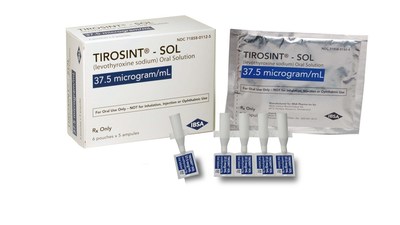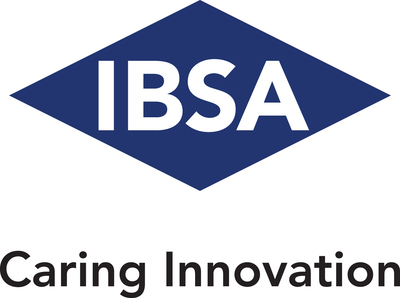A new study demonstrates that Tirosint®-SOL® (levothyroxine sodium) oral solution, a novel formulation of levothyroxine for the treatment of hypothyroidism, is unaffected by the reduction in stomach acidity caused by the proton pump inhibitor (PPI) omeprazole.
|
PARSIPPANY, N.J., Oct. 4, 2021 /PRNewswire/ -- A new study demonstrates that Tirosint®-SOL® (levothyroxine sodium) oral solution, a novel formulation of levothyroxine for the treatment of hypothyroidism, is unaffected by the reduction in stomach acidity caused by the proton pump inhibitor (PPI) omeprazole. Omeprazole and other PPI medications are powerful acid-reducing agents that are known to affect the performance of traditional levothyroxine treatments that come in tablet form. More than 20 million Americans take PPIs chronically each year to help reduce stomach acidity. ¹ Researchers from Virginia Commonwealth University and the University of Montreal examined the relative bioavailability of Tirosint®-SOL when administered as a single dose of 600 micrograms to healthy volunteers in conjunction with omeprazole versus Tirosint-SOL therapy alone over a period of six days. Study subjects were divided into three groups. One group was administered Tirosint®-SOL and omeprazole at the same time in the morning. A second group was administered Tirosint®-SOL and omeprazole at staggered times – Tirosint-SOL in the morning and omeprazole in the evening, 12 hours later. A third group was administered Tirosint®-SOL alone as the reference treatment. Blood levels of levothyroxine were measured in all groups and were demonstrated to be similar, a finding that suggests a lack of interaction between Tirosint-SOL and the PPI drug omeprazole regardless of the timing of administration of either therapy. Based on these findings, IBSA Institut Biochimique, the sponsor of the study, is planning to seek FDA approval for a change in the approved label for Tirosint-SOL. The results of the study were presented at a virtual edition of American Thyroid Association's (ATA) Annual Meeting on October 3, 2021 by Prof. Murray Ducharme of the University of Montreal. "Unlike traditional levothyroxine tablets whose dissolution and subsequent absorption are affected by the presence of acid-reducing agents, Tirosint-SOL does not need to dissolve before being absorbed and may be taken regardless of stomach acidity," said Prof. Ducharme. "These study results suggest that the presence of a powerful and long-lasting stomach acid-reducing PPI drug such as omeprazole, regardless of the timing of administration, has no effect on the bioavailability and absorption of Tirosint-SOL." Commenting on the study, Prof. Francesco Celi of Virginia Commonwealth University added that the study results should be of interest to both patients and clinicians: "The opportunity to provide patients affected by hypothyroidism with a levothyroxine formulation that is not affected by commonly-used acid-reducing agents like omeprazole may improve the consistency of hypothyroidism therapy." In a second, related study, it was demonstrated that hypothyroid patients taking both a PPI and traditional levothyroxine tablets were able to reduce their TSH, a common measure of thyroid hormone levels, when switched to a similar dose of Tirosint® Oral Solution, a drug for hypothyroidism marketed in Italy. All 22 patients that participated in the study were relying on a PPI to reduce elevated gastric pH due to a variety of gastrointestinal conditions. After being switched to the Tirosint® Oral Solution, all patients experienced an improvement in their hypothyroid status as measured by TSH. These results were confirmed when 10 study patients were switched back to their original tablet medication. Among these patients, all experienced a worsening of their hypothyroidism with TSH levels returning to a suboptimal range. The results of the study are also being presented by Dr. Poupak Fallahi of the University of Pisa in Italy at the ATA Annual Meeting. Both studies were sponsored by Institut Biochimique SA (IBSA), the developer and manufacturer of Tirosint®-SOL (levothyroxine sodium) and Tirosint® Oral Solution. Tirosint®-SOL is the only FDA-approved liquid levothyroxine formulation available in monodose packaging for convenience and dosing precision. Tirosint®-SOL is indicated to treat the full spectrum of hypothyroid patients regardless of age. Patients can administer it by pouring the contents of the monodose ampule directly into the mouth or using a spoon or mixing it with water. Tirosint®-SOL is currently available in 15 dosage strengths including new 37.5, 44 and 62.5 microgram dosing options, making it the widest dosing range of any levothyroxine therapy. It is made with only three ingredients – levothyroxine, glycerol and water – for enhanced tolerability and absorption. To help provide patients with cost-effective access to Tirosint®-SOL, IBSA recently enhanced the Tirosint-SOL Copay Savings Coupon Program. With the new program, eligible patients with commercial insurance can pay as little as $4 for a one-month supply of Tirosint®-SOL or $0 for a 3-month supply. Additional information, including money-saving options for patients without commercial insurance or with high copays or deductibles, can be found at www.TirosintSOL.com. About Hypothyroidism Hypothyroidism is an endocrine disorder with numerous causes resulting in a deficiency in thyroid hormone. More than 27 million adults have been diagnosed with hypothyroidism. ² Up to 13 million Americans have undiagnosed hypothyroidism. ³ About 2% of the U.S. population has pronounced hypothyroidism, and as much as 10% has subclinical (mild) hypothyroidism. The condition is most common in women over 40 years of age and in the elderly of both sexes.⁴The signs and symptoms of hypothyroidism are nonspecific and may include fatigue, forgetfulness, depression, constipation, muscle cramps, weight gain, dry skin and hair loss.⁵ Laboratory tests (TSH, FT3 and FT4) are the most common biochemical parameters used in diagnosing hypothyroidism.⁶ Levothyroxine sodium is a synthetic version of a hormone that is normally produced by the thyroid gland. It is used to treat patients who suffer from hypothyroidism or inadequate levels of thyroid stimulating hormone (TSH). About IBSA Pharma Inc. IBSA Pharma is part of IBSA Group, headquartered in Lugano, Switzerland. It is a world leader in the treatment of thyroid disease and has a diversified product portfolio of prescription drugs. With products on five continents and over 80 countries, IBSA is committed to scientific research and improving the health of patients. For more information about IBSA, visit www.ibsagroup.com/media. For full prescribing information, visit www.Tirosint.com. References 1. Verble, M. Inappropriate use and overdose of PPIs: a strategy for discontinuation. Pharmacy Times, August 2018:35. IMPORTANT SAFETY INFORMATION WARNING: NOT FOR THE TREATMENT OF OBESITY OR FOR WEIGHT LOSS.
CONTRAINDICATIONS
WARNINGS AND PRECAUTIONS
Limitations of Use
Adverse Reactions Adverse reactions with TIROSINT-SOL are primarily those of hyperthyroidism due to therapeutic overdosage including arrhythmias, myocardial infarction, dyspnea, muscle spasm, headache, nervousness, irritability, insomnia, tremors, muscle weakness, increased appetite, weight loss, diarrhea, heat intolerance, menstrual irregularities, and skin rash PM 01-21-0024
SOURCE IBSA Pharma, Inc. |






